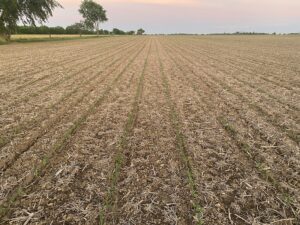Biodiversity and agriculture
INTERNATIONAL CONFERENCE FINDS A BALANCE

WHILE GLOBAL NEGOTIATIONS and agreements on climate and the environment can seem far removed from our daily lives in Canada, they can significantly impact Canadian policymaking. This is why when the world descended on Montreal in December of 2022 for COP15 (the United Nations Biodiversity Conference) to negotiate a set of goals to guide global action through 2030, we were paying close attention.
| WHAT YOU NEED TO KNOW • Delegates from more than 190 countries gathered in Montreal in December, 2022 for COP15, the United Nations Biodiversity Conference. • CropLife and other agriculture industry stakeholders participated in the conference. • While not the main focus of the conference, agriculture issues touched many of the 23 negotiated targets. • Agreed-upon targets were balanced and science-based, which is good news for Canada’s agriculture industry. • Target 7, which focuses on pesticides, focuses on reducing the risk of pesticide pollution rather than their use. • Canada is a world leader in the adoption of best management practices for the stewardship of crop protection products. |

With more than 190 countries involved in the negotiations and a wide range of stakeholders from industries including mining, oil, fashion, and agriculture on site for the weeks-long negotiations, you can imagine that consensus was not an easy thing to come by.
While not the sole focus of the event, agriculture was a significant part of the discussions, with several of the negotiated 23 targets touching agriculture. And while there were representatives from both the domestic and international agriculture communities onsite, a number of groups were also present to protest modern agricultural technologies.
These groups made some splashy headlines, but at the end of the day, science-based decision-making largely prevailed. This certainly did not happen by accident and resulted from a great deal of sustained effort from the agriculture industry to bring forward and advocate for reasonable, science-based decision-making that gives individual countries the flexibility to work towards joint goals with a domestic context in mind.
The draft language used as a starting point for negotiation on several targets was very problematic for the agriculture sector and could have spelled disaster if adopted. In many cases, this was language that favoured ideology over science, and it was clear that Europe’s approach to agricultural policy was at the forefront.
BALANCED RESULTS
Fortunately, the final result of the conference and the agreed-upon targets were relatively balanced. This is good news for countries like Canada that are highly dependent on agriculture. And ultimately, it is good for biodiversity as we can collectively focus on taking science-based measures to protect biodiversity while at the same time continuing to sustainably grow enough food to feed the world and support global food security.
Of the 23 targets being negotiated, Target 7, which is focused on pollution reduction, was among the most concerning for the agriculture sector. The draft text included language around the reduction in pesticide use by up to two-thirds. After extensive engagement from governments around the world, including the Canadian government, and industry stakeholders, the final language in Target 7 focuses on reducing the risk of pesticide pollution rather than the use. It refers to the role of integrated pest management, science as a basis, and the importance of taking into account food security and livelihoods.
Arbitrary pesticide use reduction targets, as we have seen in Europe, would have been devastating for Canada. Canada is a world leader in pesticide regulation with a risk-based system that provides the utmost protection for human health and the environment while at the same time providing growers with timely access to innovative technologies that allow them to be more productive and more sustainable. Under the Canadian system, only pesticides that have gone through a rigorous review and do not pose an unacceptable risk make it to market.
RISK REDUCTION
What we can and should collectively focus on is pesticide risk reduction. This is supported by science-based regulatory systems like we have in Canada and extensive training programs and best management practices to ensure the proper use and stewardship of pesticides. A pesticide applied to a field to control a pest and protect a crop would not be considered pollution. Instead, the focus is on ensuring that there is not any unintended off-site movement and that pesticides do not end up in places they should not.
Canada is a world leader in the adoption of best management practices for the stewardship of crop protection products with a focus on continuous improvement. And there’s an opportunity for Canada to help with knowledge transfer to other parts of the world so that we can collectively work towards some of these global targets.
Improved crop genetics also stand to play a critical role in reducing the risk of pesticide use. As more crop varieties come to market with resistance to various pests, it will give growers even more options to control pests. Gene editing stands to lead to the development of a wide variety of improved crops in the years and decades ahead.
COP15 has concluded with an agreement on high-level global targets. Next comes the negotiations on what frameworks will be used to measure success against these targets. And as always, the devil is in the details, which is why CropLife Canada will continue to monitor and engage in these discussions.
Pierre Petelle is the president and CEO of CropLife Canada.
COP15 AND COP27
Conference of the Parties (COP) 15 and 27 have been in the news recently. What’s the difference?
The 15th COP to the United Nations Convention on Biological Diversity (CBD) was held in Montreal in December 2022. First signed by 150 leaders at the 1992 Rio Earth Summitt, the CBD’s main objectives are the conservation of biological diversity, the sustainable use of the components of biological diversity, and the fair and equitable sharing of the benefits arising from the utilization of genetic resources. The CBD focuses on sustainable development to address food security, access to medicines, fresh air and water, shelter, and a clean and healthy environment. The CBD has now been ratified by 195 parties.
COP27 is short for the 27th Conference of the Parties to the United Nations Framework Convention on Climate Change, which was held in Sharm-El-Sheikh, Egypt, in November 2022. In 2015, COP21, held in Paris, resulted in the signing of the Paris Agreement, where 194 Parties signed on to address climate-related goals. COP28 will be held in November 2023 in the United Arab Emirates.
While the two conventions have run independently from each other, there is growing recognition that the issues are interconnected.
“These are two intertwined crises that need to be addressed together,” says Elizabeth Mrema, executive secretary of the Secretariat of the Convention on Biological Diversity. •


























